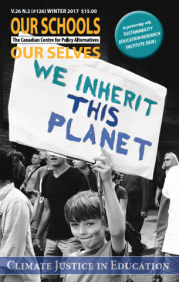 How are climate change and sustainability being taught, practiced and promoted in educational institutions across the country? And how can we make this important, often overwhelming, task a little less onerous?
How are climate change and sustainability being taught, practiced and promoted in educational institutions across the country? And how can we make this important, often overwhelming, task a little less onerous?
A Cure for Hydro Bill Headaches
As it is currently configured, Ontario's HST rebate on hydro bills is a poorly designed program.
CCPA senior economists Sheila Block and David Macdonald tested a fairer alternative to the current HST rebate program that would direct the greatest benefits to low- and middle-income households.
The Monitor, March/April 2017
This issue of the Monitor features a number of articles and new research coming out of the Corporate Mapping Project, an exciting joint initiative of the University of Victoria, the CCPA’s B.C. and Saskatchewan offices, and the Parkland Institute in Alberta that is making the links between the oil sector and political power in Canada. “People yearn for alternatives to business as usual,” write project co-directors Shannon Daub and Bill Carroll in their introductory article.
The Great Log Export Drain
This short two-part report shows that between 2013 and 2016, more raw logs were shipped from BC than during any other four-year period in the province’s history. If these logs had been processed in some of BC’s hardest hit forestry communities, at least 3,600 new jobs could have been generated. This has prompted two forest industry unions and three leading environmental groups to call for a ban on raw log exports from old-growth forests and bold government action to stimulate BC’s flagging forest sector.
It’s time for the BC government to curb raw log exports and boost value-added forestry jobs, say unions and environmental groups
(Vancouver) Between 2013 and 2016, more raw logs were shipped from BC than during any other four-year period in the province’s history, prompting two forest industry unions and three leading environmental groups to call for a ban on raw log exports from old-growth forests and bold government action to stimulate BC’s flagging forest sector.
Our Schools/Our Selves: Winter 2017
How is climate change and sustainability being taught, practiced and promoted in educational institutions across the country? To help answer that question, this issue of Our Schools/Our Selves profiles some of the work of the Sustainability Education Research Institute (SERI) at the University of Saskatchewan, and its flagship program, the Sustainability and Education Policy Network (sepn.ca). This collection is sure to be invaluable to educators and students keen to address this topic as workers, as students, as unionists, as activists, and as community members.
From NAFTA to CETA: Corporate lobbying through the back door
Business lobby groups have long complained of different consumer protection and health measures creating unreasonable “barriers” to trade and investment. They have now identified international co-operation, with industry input at the earliest stages of regulatory development, as the next great leap forward to shape globalization according to their interests.
Is Canada exporting its climate problem?
Our latest study shows a dramatic rise in Canada’s greenhouse gas emissions from fossil fuel extraction. In 2015 (the most recent year there was data available) Canada’s extraction activities yielded almost 1.2 billion tonnes of carbon dioxide.
If all producer countries act like Canada and continue down this path, we’ll blow right by the targets set at the Paris Agreement on Climate Change – and heat our planet far more than the < 2ºC target. Learn more at: policyalternatives.ca/extracted
Extracted Carbon
![]() This study re-examines Canada’s contribution to global climate change in light of the Paris Agreement by looking at extracted carbon—the total amount of fossil fuels removed from Canadian soil that ends up in the atmosphere—whether used for domestic purposes or exported and combusted elsewhere.
This study re-examines Canada’s contribution to global climate change in light of the Paris Agreement by looking at extracted carbon—the total amount of fossil fuels removed from Canadian soil that ends up in the atmosphere—whether used for domestic purposes or exported and combusted elsewhere.
Is Canada exporting its climate problem?
Answer: Yes.




